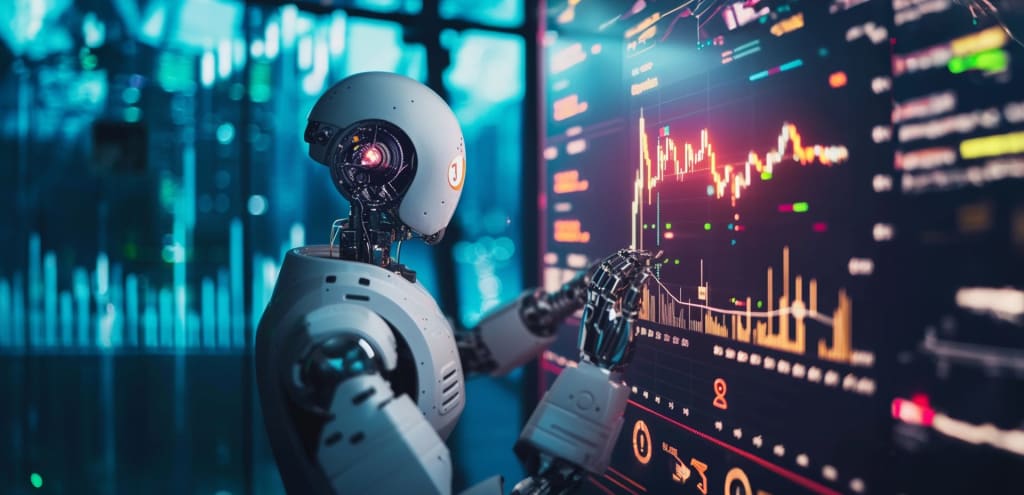AI in Algorithmic Trading:
Wall Street Gets a Robo-Advisor Overlord (Here’s Why It’s a Good Thing)

The financial landscape on Wall Street is undergoing a profound transformation, largely driven by the advent and integration of Artificial Intelligence (AI) in algorithmic trading. This technological evolution is not just a fleeting trend but a significant shift that promises to redefine the very foundations of trading and investment strategies.
The Rise of AI in Trading
Algorithmic trading, the use of computer algorithms to execute trades at high speeds and volumes, has been around for decades. However, the incorporation of AI into these algorithms is a relatively recent development that amplifies their capabilities exponentially. Traditional algorithmic trading relies on predefined rules and historical data to make decisions. In contrast, AI algorithms, particularly those utilizing machine learning (ML), can learn from new data and adapt their strategies in real-time, offering a dynamic and highly responsive trading approach.
Advantages of AI-Driven Trading
One of the primary advantages of AI in trading is its ability to process vast amounts of data much faster than any human can. This includes not only market data but also news articles, social media sentiments, and even weather reports, all of which can influence market movements. By analyzing this data, AI can identify patterns and correlations that might be invisible to human traders, allowing for more accurate predictions and timely decision-making.
Furthermore, AI reduces the risk of human error, which can be significant in the high-stakes world of trading. Emotional biases, fatigue, and inconsistent decision-making are common pitfalls for human traders, but these are non-issues for AI systems. This leads to more consistent and reliable performance, even in volatile market conditions.
Impact on Market Efficiency and Liquidity
AI's influence extends beyond individual trading firms to the broader financial market. By enabling faster and more accurate trades, AI contributes to market efficiency, ensuring that prices more accurately reflect available information. This increased efficiency benefits all market participants by reducing the likelihood of significant mispricings and ensuring smoother market operations.
Moreover, AI can enhance market liquidity. High-frequency trading (HFT) firms, which use AI to execute large volumes of trades in fractions of a second, provide much-needed liquidity to the markets. This liquidity is crucial for the proper functioning of financial markets, as it ensures that there are always buyers and sellers available, making it easier to enter and exit positions without significant price disruptions.
Democratization of Trading
Another notable impact of AI in algorithmic trading is the democratization of trading capabilities. Advanced trading strategies were once the exclusive domain of large financial institutions with substantial resources. However, AI-powered trading tools are becoming more accessible, enabling smaller firms and even individual traders to leverage sophisticated algorithms. This leveling of the playing field fosters greater competition and innovation within the market.
Challenges and Ethical Considerations
Despite its numerous benefits, the rise of AI in trading also presents several challenges and ethical considerations. One of the main concerns is the potential for market manipulation. AI algorithms, if not properly regulated, could be used to execute manipulative trading strategies at scales and speeds that are difficult to detect and prevent.
Additionally, the increasing reliance on AI raises questions about accountability. In cases where AI-driven trades lead to significant financial losses or market disruptions, it can be challenging to determine responsibility. This necessitates robust regulatory frameworks to ensure that AI in trading operates transparently and ethically.
The Future of AI in Trading
Looking ahead, the role of AI in algorithmic trading is set to expand even further. As AI technologies continue to advance, their applications in trading will become more sophisticated, encompassing everything from risk management to portfolio optimization. Financial institutions that adopt AI will likely gain a competitive edge, while those that resist may find themselves at a disadvantage.
In conclusion, AI in algorithmic trading represents a significant leap forward for Wall Street. By enhancing efficiency, accuracy, and accessibility, AI is not only transforming how trades are executed but also shaping the future of the financial markets. While challenges remain, the potential benefits of AI-driven trading are too significant to ignore, heralding a new era of innovation and growth in the financial sector.
Click here to read the blog.
About the Creator
Enjoyed the story? Support the Creator.
Subscribe for free to receive all their stories in your feed. You could also pledge your support or give them a one-off tip, letting them know you appreciate their work.





Comments
Bipin Kondalkar is not accepting comments at the moment
Want to show your support? Send them a one-off tip.